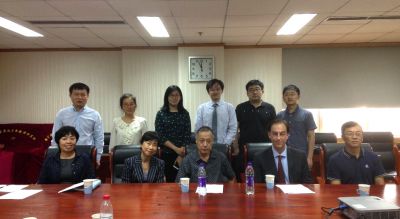
Findings from the WISERD Civil Society project, ‘Territoriality and Third Sector Engagement in Policy-making and Welfare Provision’, were recently presented to two of China’s leading institutions.
WISERD Co-Director, Professor Paul Chaney, gave a presentation to the leading Chinese Government Research body, the Beijing-based Institute of Economic Reform. He outlined research findings on the impact of ‘sub-state governance’ – or devolution – on the promotion of gender equality in civil society and beyond.
Drawing on recent work (Chaney, P. in Mannay, 2016) [i] Professor Chaney offered a critical assessment of the progress made over the National Assembly for Wales’s first eighteen years. Attention focused on the nature and quality of women’s political representation and participation, and the issues and challenges associated with devolved policy work.
The presentation explored how women’s organisations in civil society have adapted to devolved governance, and how well the institutional design and implementation of devolution has served the pursuit of equality. He argued that civil society organisations (CSOs) face real challenges in relation to their capacity to engage with politics and policy-making owing to the effects of austerity and staffing cuts.
Subsequently, in a keynote presentation to the Chinese Academy of Social Sciences (CASS) in Beijing, Professor Chaney outlined current work on the changing territorial administration of the third sector. Drawing on research in Wales, he highlighted post-war change, and shifting patterns and processes of governance, and how this has affected the way third sector organisations shape and deliver welfare.
Particular attention was given to contemporary case studies of the way third sector organisations are responding to a new piece of Welsh legislation – the Social Services and Well-being (Wales) Act (2014). This places a duty on local government to promote third sector involvement in the delivery of care services.
The emerging findings show that third sector organisations report mixed progress. While a number spoke of a welcome level of engagement and influence in shaping local service delivery, others highlighted resource and capacity issues. Professor Chaney argued that the present was an exciting, if challenging, time for seeking innovative solutions in the ‘mixed economy of social welfare’, whereby third sector organisations complement provision by statutory agencies.
[i] Chaney, P. (2016) ‘Women and Policy-Making: Devolution, Civil Society and Political Representation’, Chapter 11 in Mannay, D. (ed) Our Changing Land: Revisiting Gender, Class and Identity in Contemporary Wales, Cardiff, University of Wales Press, ISBN 978-1-78316-884-2
Pictured above: Professor Paul Chaney, seated second from right, with members of the Chinese Government Research body, the Institute of Economic Reform.
